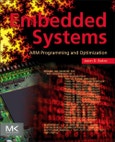Embedded Systems: ARM Programming and Optimization combines an exploration of the ARM architecture with an examination of the facilities offered by the Linux operating system to explain how various features of program design can influence processor performance. It demonstrates methods by which a programmer can optimize program code in a way that does not impact its behavior but improves its performance. Several applications, including image transformations, fractal generation, image convolution, and computer vision tasks, are used to describe and demonstrate these methods. From this, the reader will gain insight into computer architecture and application design, as well as gain practical knowledge in the area of embedded software design for modern embedded systems.
Please Note: This is an On Demand product, delivery may take up to 11 working days after payment has been received.
Table of Contents
1. The Linux/ARM Embedded Platform2. Multicore and Data-Level Optimization: OpenMP and SIMD3. Arithmetic Optimization and the Linux Framebuffer4. Memory Optimization and Video Processing5. Embedded Heterogeneous Programming with OpenCLA. Adding PMU Support to Raspbian for the Generation 1 Raspberry PiB. NEON Intrinsic ReferenceC. OpenCL Reference








